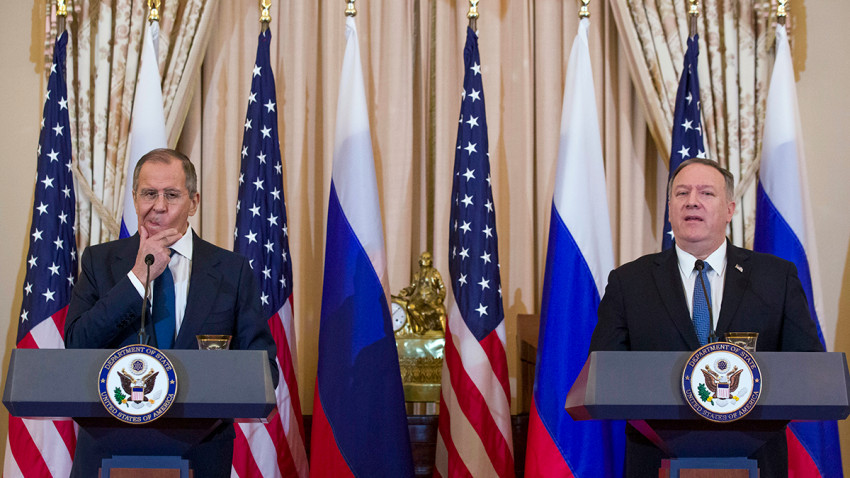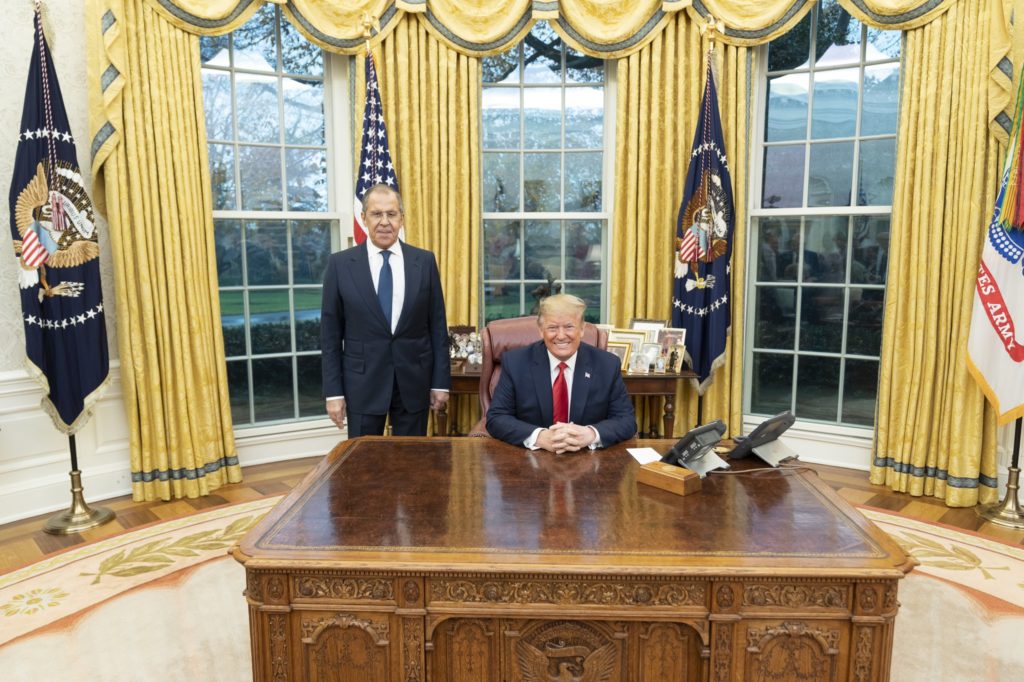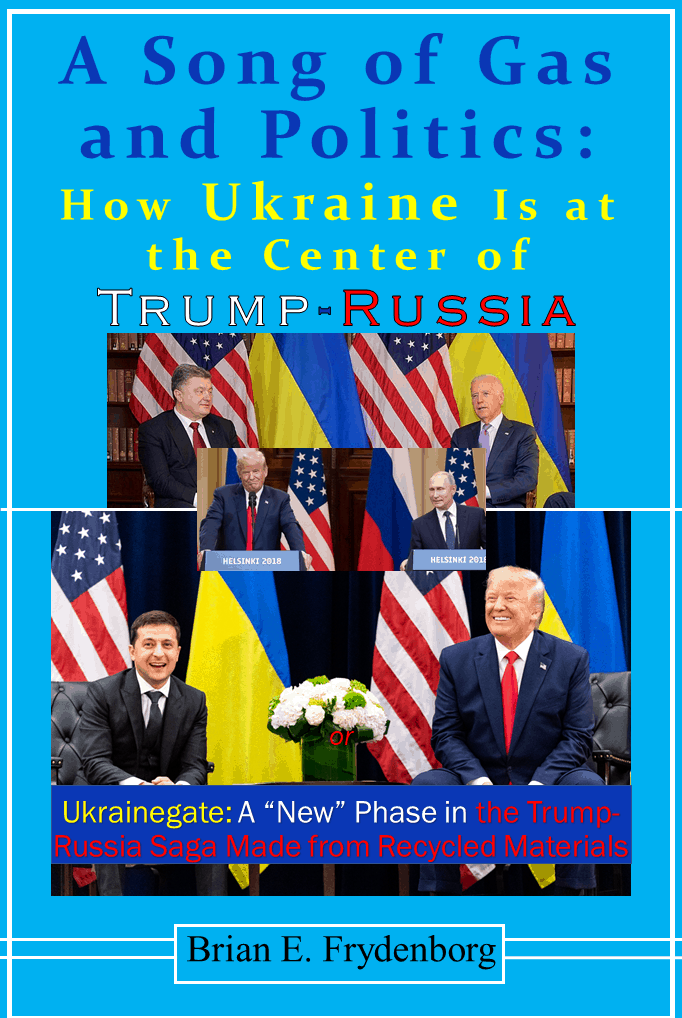After President Donald Trump’s and Secretary of State Mike Pompeo’s embarrassing meetings today with Russian Foreign Minister Sergei Lavrov, now is the perfect time to acknowledge the Kremlin acts with hostility towards the U.S.; it’s high time America responded in kind and then some.
By Brian E. Frydenborg (LinkedIn, Facebook, Twitter @bfry1981) December 10, 2019; see Brian’s related Dec. 24, 2020 article: The History of Russia’s Cyberwarfare Against NATO Shows It Is Time to Add to NATO’s Article 5 and June 7, 2021 article: Already in a Cyberwar with Russia, NATO Must Expand Article 5 to Include Cyberwarfare

WASHINGTON & ARLINGTON — U.S. “engagement” with Russia needs to shift dramatically to acknowledge obvious reality: Russian President Vladimir Putin’s Kremlin is actively hostile to the United States and constantly seeking to undermine its interests and those of our allies and Western democracy in general. While open military conflict is obviously the wrong approach, far short of such action, America must meet Russia’s state of hostility with hostility, countering Russian moves to undermine America with our own forceful undermining of Putin’s power and the Kremlin’s reach and credibility.
Russia is not our friend and does not act in good faith. Pretending otherwise gives the U.S. no advantages. From Syria to Ukraine, from arms control to our own election security, treating Russia as a serious partner willing to play ball has only led to frustration, destabilization, death, and humiliation. To make matters worse, the current extraconstitutional U.S. presidency, in particular Donald Trump’s White House, is clearly compromised by the Kremlin to the degree that, unwittingly or not, Donald Trump is acting in the Kremlin’s interests and is undermining American interests, despite the best efforts of his own political appointees, career intelligence officials, diplomats, bureaucrats, and other “adults-in-the-room.” Furthermore, the Republican Party as a whole has been coopted to a degree by Russia, too, with an unprecedented amount of Russian money going to fund and promote Republicans and Republican-affiliated organizations like the NRA and with Republican leadership and rank-and-file all too happy both to turn a blind eye to election security (since doing so benefits them) and to adopt Kremlin talking points and tactics.

In the entire history of Russo-American relations, never has the U.S. been at such an overall disadvantage, let alone a major disadvantage, as it is now, but with Russia’s own Agent Orange in the Oval Office, it is what it is. The question, now, from our compromised position, is: what do we do to fix it and deal with Russia effectively?
We can play hardball, with or without President Trump. Simply put, Russia—Putin’s Kremlin specifically—has greatly benefitted from its hostile posture towards the United States with minimal cost in return. It will continue to do so until it becomes more harmful than beneficial, and for this to be understood, Russia must experience harm in a way that sinks deep and puts fear back into calculus of the Kremlin, as was the case during the Cold War.
We know that Russia has been owning us as far as cyberwarfare. We, too, can hack secrets of prominent Russian politicians and release them through third-parties like the Russians did with WikiLeaks in 2015-2016. We can impose severe penalties on platforms like Facebook and Twitter for disseminating what is clear Kremlin propaganda online. We can also ban RT and Sputnik in the U.S. The U.S. must also set up its own media arms like RT and Sputnik to be broadcast aggressively and to offer free VPN services for native Russian speakers and readers that will allow them to bypass any censorship the Kremlin can muster against them.
The United States, not Russia, is the world’s largest natural gas producer. If the Kremlin wants to play hardball with its gas assets, so can the U.S., and more so. Russia’s state-run Gazprom often sells at a loss to further the Kremlin’s geopolitical aims; the U.S. government, in turn, can buy up stocks of natural gas from its own private sector and then sell at far lower rates than Gazprom to Europe even as it sanctions Gazprom for any of an array of offenses the company has committed over the years.
Russia has supported secessionist movements to harm the West, from Brexit and Scotland to Catalonia and Donetsk. The Russian Federation is rife with minorities with centuries of grievances against Russia whose pots can also be stirred by propaganda. And where Russia has aggressively countered Western influence in places like Moldova and the Central African Republic, the U.S. can offer even more economic aid in exchange for alignment with the U.S. and democracy.
We can offer far more military support to Ukraine and engage in deniable special operations missions. Russia’s one aircraft carrier, the aging Admiral Kuznetsov, might meet with an unfortunate accident next time it ventures far from home…
Perhaps most effectively, we can go after Putin’s and his henchmen’s money.
From the internet to gas, we can outplay Russia with the strengths it has used against us. Most actions can be undertaken by Congress even without the president. The time to act is now.
See Brian’s see Brian’s related Dec. 24, 2020 article: The History of Russia’s Cyberwarfare Against NATO Shows It Is Time to Add to NATO’s Article 5, June 7, 2021 article: Already in a Cyberwar with Russia, NATO Must Expand Article 5 to Include Cyberwarfare, and e-Book, A Song of Gas and Politics: How Ukraine Is at the Center of Trump-Russia, or, Ukrainegate: A “New” Phase in the Trump-Russia Saga Made from Recycled Materials, available for Amazon Kindle and Barnes & Noble Nook; preview here

© 2019 Brian E. Frydenborg all rights reserved, permission required for republication, attributed quotations welcome
Brian E. Frydenborg is an American freelance writer, academic, and consultant from the New York City area. You can follow and contact him on Twitter: @bfry1981
If you appreciate Brian’s unique content, you can support him and his work by donating here
Feel free to share and repost this article on LinkedIn, Facebook, and Twitter. If you think your site or another would be a good place for this or would like to have Brian generate content for you, your site, or your organization, please do not hesitate to reach out to him!